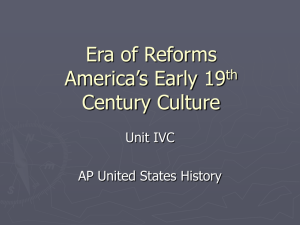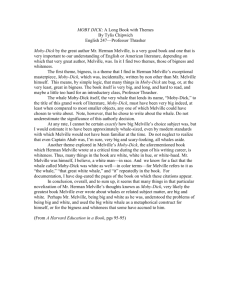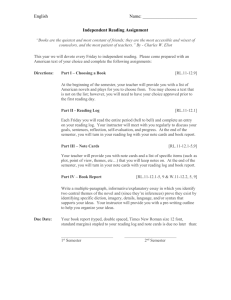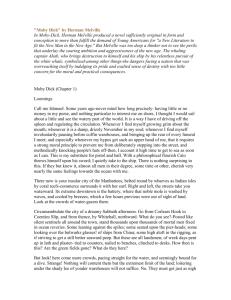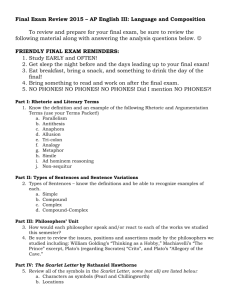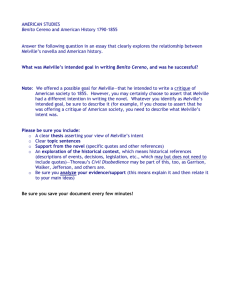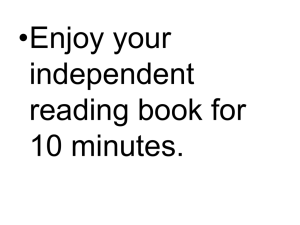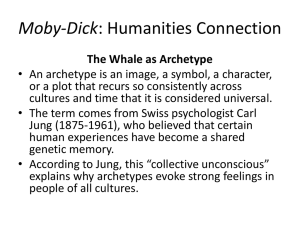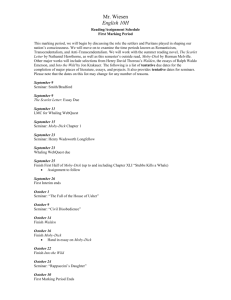Syllabus - Blogs@UWW
advertisement
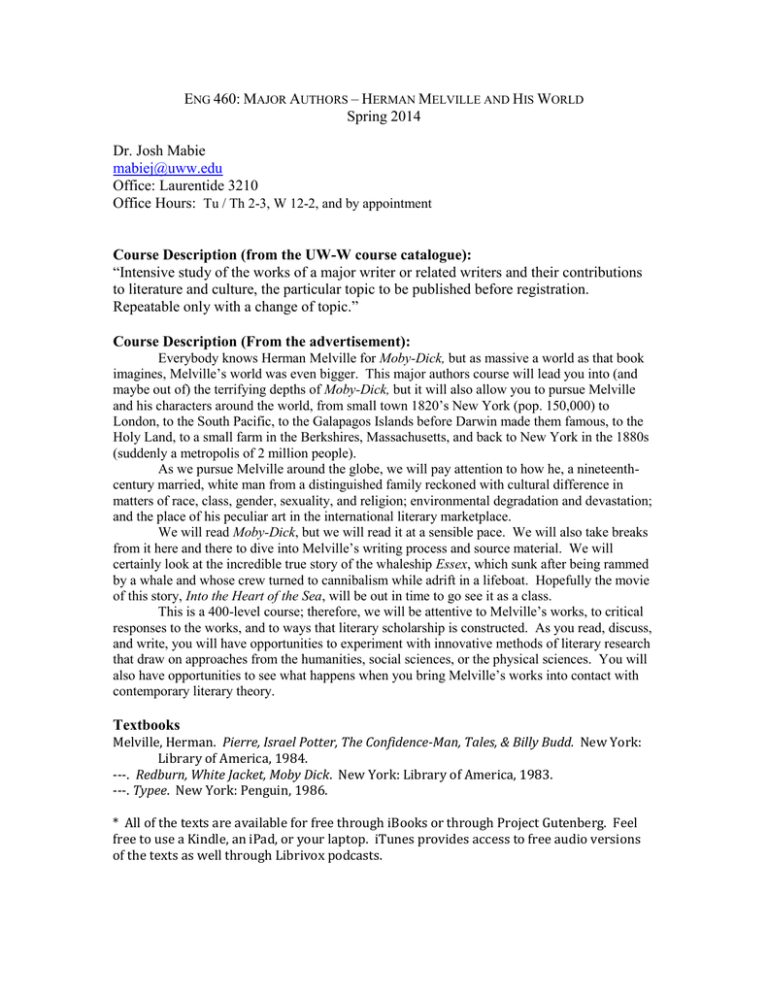
ENG 460: MAJOR AUTHORS – HERMAN MELVILLE AND HIS WORLD Spring 2014 Dr. Josh Mabie mabiej@uww.edu Office: Laurentide 3210 Office Hours: Tu / Th 2-3, W 12-2, and by appointment Course Description (from the UW-W course catalogue): “Intensive study of the works of a major writer or related writers and their contributions to literature and culture, the particular topic to be published before registration. Repeatable only with a change of topic.” Course Description (From the advertisement): Everybody knows Herman Melville for Moby-Dick, but as massive a world as that book imagines, Melville’s world was even bigger. This major authors course will lead you into (and maybe out of) the terrifying depths of Moby-Dick, but it will also allow you to pursue Melville and his characters around the world, from small town 1820’s New York (pop. 150,000) to London, to the South Pacific, to the Galapagos Islands before Darwin made them famous, to the Holy Land, to a small farm in the Berkshires, Massachusetts, and back to New York in the 1880s (suddenly a metropolis of 2 million people). As we pursue Melville around the globe, we will pay attention to how he, a nineteenthcentury married, white man from a distinguished family reckoned with cultural difference in matters of race, class, gender, sexuality, and religion; environmental degradation and devastation; and the place of his peculiar art in the international literary marketplace. We will read Moby-Dick, but we will read it at a sensible pace. We will also take breaks from it here and there to dive into Melville’s writing process and source material. We will certainly look at the incredible true story of the whaleship Essex, which sunk after being rammed by a whale and whose crew turned to cannibalism while adrift in a lifeboat. Hopefully the movie of this story, Into the Heart of the Sea, will be out in time to go see it as a class. This is a 400-level course; therefore, we will be attentive to Melville’s works, to critical responses to the works, and to ways that literary scholarship is constructed. As you read, discuss, and write, you will have opportunities to experiment with innovative methods of literary research that draw on approaches from the humanities, social sciences, or the physical sciences. You will also have opportunities to see what happens when you bring Melville’s works into contact with contemporary literary theory. Textbooks Melville, Herman. Pierre, Israel Potter, The Confidence-Man, Tales, & Billy Budd. New York: Library of America, 1984. ---. Redburn, White Jacket, Moby Dick. New York: Library of America, 1983. ---. Typee. New York: Penguin, 1986. * All of the texts are available for free through iBooks or through Project Gutenberg. Feel free to use a Kindle, an iPad, or your laptop. iTunes provides access to free audio versions of the texts as well through Librivox podcasts. What you can expect to learn in English 460 Course Objectives After successfully completing this course, students should be able to: 1. Demonstrate knowledge by: - Narrating the arc of Melville’s artistic career - Describing critical responses to Melville’s work over time – early fame, scorn, modernist recuperation, postcolonial resuscitation. - Analyzing and describing literary style by describing diction, syntax, imagery, details, and figurative language. - Explaining Melville’s positions on the role of ethics, morality, and virtue in literature. - Explaining why critics and the general reading public embrace or dismiss realist and naturalist writing at different points in American history. 2. Demonstrate that they have acquired and refined writing and research skills by: - Developing interesting and important questions and arguments - Finding, evaluating, interpreting, and synthesizing secondary material about literary texts to engage and participate in ongoing scholarly conversations. - Completing a research project 3. Analyze and evaluate Melville’s representation of race, class, gender, and sexuality to both make a historical argument and to comment on present political realities. 4. Develop ideas about literature’s ability to exert pressure on social and political problems, both by enforcing the status quo and by stimulating change. 5. Consider the degree to which literature can or cannot communicate unfamiliar experiences to readers with enough force to move them. 6. Bring knowledge from other disciplines (history, the social and natural sciences, and the arts) to bear upon the study of literature and weigh the authority of disciplinary claims as they relate to literary arguments. Course Outcomes English 460 contributes to the following LEAP Essential Learning Outcomes: You will gain: ★ Knowledge of Human Cultures Engage with big questions, both contemporary and enduring ★ Intellectual and Practical Skills, including Inquiry and analysis Critical and creative thinking Written and oral communication Teamwork and problem solving ★ Personal and Social Responsibility Civic Knowledge and engagement – local and global Intercultural Knowledge and competence Ethical reasoning and action Foundations and skills for lifelong learning ★ Integrative and Applied Learning Across general and specialized studies Course Requirements 1. 2. 3. 4. 5. Writing Assignments a. Close reading of a passage (2 pages) b. Analysis of a primary source (1 ½ - 2 pages) c. Analysis of an review before 1890 (1 to 1 ½ pages) d. Analysis of a scholarly article after 1980 (1 to 1 ½ pages) e. Review of an internet aid (1 to 1 ½ pages) Researched essay (8 pages) - Abstract (350 words) - Preliminary Bibliography (10 sources formatted according to MLA or Chicago style guidelines) - Essay Draft Conversation Starter Each student will present a one or two sentence, arguable thesis about one day’s reading. Like all good theses, these argumentative statements should be clear, debatable, and appropriately focused. Please email your conversation starter to me (mabiej@uww.edu) by 9:00 am on the day that it is due. Quizzes You will have opportunities to engage with the reading in short answer written form over the course of the semester. I give these quizzes to encourage you to keep up with the reading, to give you an opportunity to voice your responses to the course material, and to spur discussion. The quizzes are unscheduled and cannot be made up if they are missed. Class Participation and Attendance This course cannot succeed without vigorous student participation. Please come to class having carefully read the assignment and be prepared to voice your thoughts. Please also come to class on time and stay the whole time. I will assess your participation according to the following criteria: A B C D Did not miss class, completed the reading and brought original ideas or arguments about it to class, made thoughtful verbal contributions to the discussion most days, provided especially thorough feedback during peer review sessions. Missed only one or two classes, completed the reading and was ready to talk about it, made contributions to discussion once or twice a week, provided helpful feedback during peer review sessions. Came to class regularly, completed the reading, but hadn’t really thought about it, spoke in class only when called upon, completed peer review. Missed more than 3 classes, listened to iPod, surfed the internet, texted friends, provided meager peer review feedback. F Absent for long stretches of time, disengaged or disruptive during class, unwilling or unable to engage when called upon. A few words on electronics. . .I have recently become a huge fan of reading books on my iPad, but I recognize that iBooks is not the only app that I can access on the device. You may read the course materials on a Kindle, your laptop, or an iPad, but please do not surf the internet, play games, text message, or chat during class. If I see you distracted by your electronic device, I may ask you to put it away, but I may just make a note of your disengagement from the class and reduce your participation grade. Please silence and stow your phone during class. Grading Your final grade will be figured according to the following percentages: Assignment Percentage of Grade Close reading of a passage 10 Analysis of a primary source 10 Analysis of an historical review (before 1890) 10 Analysis of a scholarly article (after 1980) 10 Analysis of an Internet Aid 10 Researched Essay (8 pages) 30 Participation, Attendance, Quizzes, and Conversation Starter 20 Grading Scale 94-100 90-93 88-89 84-87 80-83 78+79 74-77 70-73 60-69 0-59 A AB+ B BC+ C CD F Plagiarism and Academic Integrity It is your responsibility to accurately present work that you turn in and to properly cite sources that you use. Chapter fourteen of the UW system student handbook describes academic misconduct and its consequences: Academic misconduct in an act in which a student: - Seeks to claim credit for the work or efforts of another without authorization or citation; - Uses unauthorized materials or fabricated data in any academic exercise; - Forges or falsifies academic documents or records; - Intentionally impedes or damages the academic work of others; - Engages in conduct aimed at making false representation of a student's academic performance; - Assists other students in any of these acts. Examples of academic misconduct include, but are not limited to: cheating on an examination; collaborating with others in work to be presented, contrary to the stated rules of the course; submitting a paper or assignment as one's own work when a part or all of the paper or assignment is the work of another; submitting a paper or assignment that contains ideas or research of others without appropriately identifying the sources of those ideas; stealing examinations or course materials; submitting, if contrary to the rules of a course, work previously presented in another course; tampering with the laboratory experiment or computer program of another student; knowingly and intentionally assisting another student in any of the above, including assistance in an arrangement whereby any work, classroom performance, examination or other activity is submitted or performed by a person other than the student under whose name the work is submitted or performed. (http://www.uww.edu/handbook/student/system_1403.html) Please feel free to consult me with any questions you have about citing sources and feel free to make use of resources on campus to help you avoid plagiarism. The time to have this conversation is before you turn in your final draft for a grade. If you have significant concerns, you might also consider participating in one of the Academic Support Center's plagiarism workshops (see http://www.uww.edu/acadsupport/tutorial/plagiarism_workshop_registration.html for more information). The best way to avoid getting caught up in a messy and unpleasant academic misconduct imbroglio is to do your own work and to save all of the notes and drafts that you used to create your paper. If you compose on a computer, it is always a good idea to save multiple versions of your paper when you make substantial revisions. You can also email drafts to yourself. Deadlines Unless you arrange for an extension in advance of the deadline, I will not accept late papers. Plan ahead and turn in your assignments on time. Pop quizzes cannot be made up. Papers must be turned in on paper; I will not accept emailed papers. You may print your papers double sided or you may print on the backs of previously printed pages if you would like to save paper. Special Needs The university in general and I in particular are committed to providing, on a flexible and individual basis, reasonable accommodation to students who have documented disability conditions (e.g. physical, learning, psychiatric, vision, hearing, or systemic) that may affect their ability to participate in course activities or to meet course requirements. If you have a disability that requires accommodation, please contact both the Center for Students with Disabilities and me to discuss your individual needs. The Center for Students with Disabilities is located on the first floor of Andersen Library in room 2002. You can also call them at 262-472-4711(Main Phone/Relay) or 262-472-1109 (TTY), and you can find the Center on the web at http://www.uww.edu/csd/ Course Calendar 1/21 Welcome, Introductions, Moby-Dick Please bring three pop or high culture references to Moby-Dick to this first class meeting. Why a whole course on one author? Why Herman Melville? What is the Use of Biography? A brief critical history. Read in Class: Parker, Hershel. “Preface,” to Melville Biography: An Inside Narrative (Evanston, IL: Northwestern, 2012). 1/23 I. The Empire State Redburn ch. 1-7 Please return the index card I have provided with the following information 1. Photograph of your choice 2. Name 3. Hometown 4. Major and/or career aspiration 5. Why did you take this class? 1/28 Redburn ch. 30-34, 43-46 1/30 Mabie, “Herman Melville and Nineteenth-Century American Dwelling” (D2L PDF) Read one chapter of Hershel Parker’s Herman Melville: A Biography (Volume 1 or 2) (HAL Reserve) 2/4 Typee ch. 1-5 II. The South Pacific February 4 at 7:30 pm - Hamlet at the Young Auditorium (Optional) 2/6 Typee ch. 6-10 2/11 Tools for Literary Scholarship (WorldCat, MLA Bibliography, and Scholarly Editions) Meet in Harold Anderson Library Typee ch. 11-15 2/14 Typee ch. 16-22 2/18 Graded Discussion (Group A 12:30- 1:05, Group B 1:10-1:45) Typee ch. 23-27 2/20 Typee ch. 28-34 2/25 Typee Appendix and The Story of Toby: A Sequel to ‘Typee’ Read: “Before Moby-Dick: International Controversy over Melville” (D2L PDF) III. Pittsfield, MA 2/27 Context for Moby-Dick - Into the Deep: America, Whaling and the World (Film in class) Moby-Dick ch. 1-12 3/4 Moby-Dick ch. 13-24 3/6 Moby-Dick ch. 25-36 3/11 Moby-Dick ch. 37 – 49 Survey Norton Critical Editions of Moby-Dick, Walden, and The Scarlet Letter (Library Reserve) 3/13 Moby-Dick ch. 50 - 63 3/18 “Hawthorne’s Mosses” (LIA 1154-1173) 3/20 Moby-Dick ch. 64 – 80 Last Day to Turn in Writing Assignments a. Close reading of a passage (2 pages) b. Analysis of a primary source (1 ½ - 2 pages) c. Analysis of an review before 1890 (1 to 1 ½ pages) d. Analysis of a scholarly article after 1980 (1 to 1 ½ pages) e. Review of an internet aid (1 to 1 ½ pages) No Class March 24 to March 28: Spring Break 4/1 Moby-Dick ch. 81-93 4/3 Moby-Dick ch. 94-109 Research Paper Abstract Due 4/8 Graded Discussion (Group A 12:30- 1:05, Group B 1:10-1:45) Moby-Dick ch. 110-130 4/10 Moby-Dick ch. 131- Epilogue Preliminary Bibliography Due 4/15 “I and My Chimney” and “The Piazza” (LIA 1298-1327;621-635) 4/17 Benito Cereno (LIA) IV. Palestine, New York 4/22 Battle Pieces (D2L PDF) 4/24 Holy Land Journal (D2L PDF) 4/29 Clarel (D2L PDF) 5/1 Clarel (D2L PDF) 5/6 Billy Budd ch. 1-15 (LIA) Research Paper Due 5/8 Billy Budd ch. 16- Billy in the Darbies (LIA)
